
Nadja Tiller was an Austrian actress in film, television, and on stage. She was one of the most popular German-speaking actresses in the international cinema of the 1950s and 1960s, receiving international recognition when she played the title role in the 1958 film Das Mädchen Rosemarie (Rosemary) in 1958, shown at the Venice Film Festival. It opened the way to international films. She often played alongside her husband, Walter Giller.

The Simple Girl is a 1957 West German musical comedy film directed by Werner Jacobs and produced by Artur Brauner. It starred Caterina Valente, Rudolf Prack and Ruth Stephan.

Hello, My Name Is Cox is a 1955 West German crime comedy film directed by Georg Jacoby and starring Johannes Heesters, Claude Borelli and Kurt Meisel. It was shot at the Bavaria Studios in Munich and on location in Brussels and Antwerp. It is an adaptation of the novel Gestatten, mein Name ist Cox by Rolf Becker and Alexandra Becker.

The Congress Dances is a 1955 Austrian historical musical film directed by Franz Antel and starring Johanna Matz, Rudolf Prack and Hannelore Bollmann. It is a remake of the 1930 film The Congress Dances.
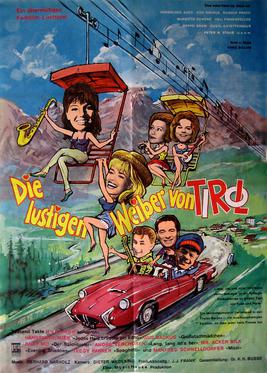
The Merry Wives of Tyrol is a 1964 West German musical comedy film directed by Hans Billian and starring Hannelore Auer, Gus Backus and Rudolf Prack.
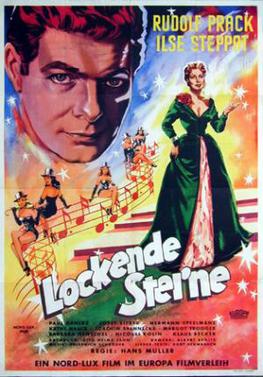
Shooting Stars is a 1952 West German drama film directed by Hans Müller and starring Rudolf Prack, Ilse Steppat and Margot Trooger. It was made at the Göttingen Studios and partly on location in Hamburg. The film's sets were designed by the art directors Mathias Matthies and Ellen Schmidt.

Illusion in a Minor Key is a 1952 West German drama film directed by Rudolf Jugert and starring Hildegard Knef, Sybille Schmitz and Hardy Krüger. It was made at the Bavaria Studios in Munich. It was one of the last films produced by the veteran Erich Pommer who had returned to Germany from exile after the Second World War. The film's sets were designed by Ludwig Reiber. It is sometimes included on lists of film noirs.

Reaching for the Stars is a 1955 West German drama film directed by Carl-Heinz Schroth and starring Erik Schumann, Liselotte Pulver and Gustav Knuth.

Hit Parade is a 1953 West German musical comedy film directed by Erik Ode and starring Germaine Damar, Walter Giller and Nadja Tiller.

Come Back is a 1953 West German drama film directed by Alfred Braun and starring Winnie Markus, Rudolf Prack and Hans Stüwe. It was shot at the Bendestorf and Wandsbek Studios in Hamburg. Location shooting took place around Stade and on the Rhine. The film's sets were designed by the art directors Hans Ledersteger, Ernst Richter and Hans Richter.
A Heart Beats for You is a 1949 German romance film directed by Joe Stöckel and starring Rudolf Prack, Annelies Reinhold and Franz Loskarn.

Mask in Blue is a 1953 West German musical film directed by Georg Jacoby and starring Marika Rökk, Paul Hubschmid and Wilfried Seyferth. It was made at the Bavaria Studios in Munich and on location in Rome. The film's sets were designed by the art director Erich Kettelhut. It was shot in Agfacolor. It is an operetta film based on the stage work of the same name composed by Fred Raymond. A previous film version was made in 1943.

Girl with a Future is a 1954 West German comedy drama film directed by Thomas Engel and starring Herta Staal, Peter Pasetti and Nadja Tiller. It was shot at the Tempelhof Studios in West Berlin.The film's sets were designed by the art directors Emil Hasler and Walter Kutz.

What Is Father Doing in Italy? is a 1961 West German musical comedy film directed by Hans Dieter Schwarze and starring Willy Fritsch, Gerhard Riedmann and Peter Kraus. It was shot in Agfacolor.
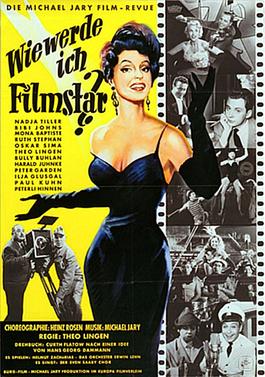
How Do I Become a Film Star? is a 1955 West German musical comedy film directed by Theo Lingen and starring Nadja Tiller, Harald Juhnke and Bibi Johns.

The Big Star Parade is a 1954 West German musical comedy film directed by Paul Martin and starring Adrian Hoven, Renate Holm and Gunther Philipp.
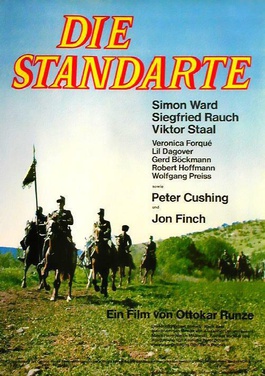
The Standard is a 1977 war drama film directed by Ottokar Runze and starring Simon Ward, Siegfried Rauch and Peter Cushing. It was made as a co-production between Austria, Spain and West Germany. The film is based on the 1934 novel The Standard by Alexander Lernet-Holenia, previously turned into a 1935 film My Life for Maria Isabella in Nazi Germany. It premiered at the Cannes Film Festival.
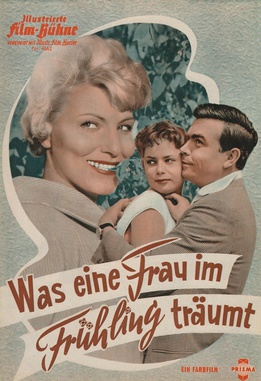
What a Woman Dreams of in Springtime is a 1959 West German romantic comedy film directed by Erik Ode and Arthur Maria Rabenalt and starring Rudolf Prack, Winnie Markus and Ivan Desny.
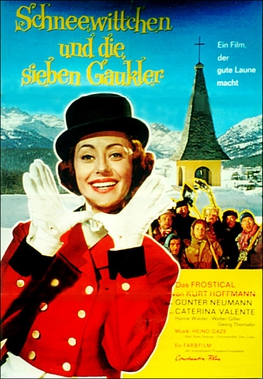
Snow White and the Seven Jugglers is a 1962 Swiss-West German musical comedy film directed by Kurt Hoffmann and starring Caterina Valente, Walter Giller and Georg Thomalla.

Love, Dance and a Thousand Songs is a 1955 West German musical comedy film directed by Paul Martin and starring Caterina Valente, Peter Alexander and Rudolf Platte. It is a revue film, showcasing a number of different performers. It was filmed at the Spandau Studios in West Berlin and on location around Mittenwald in Bavaria. The film's sets were designed by the art directors Hans Jürgen Kiebach and Gabriel Pellon.



















